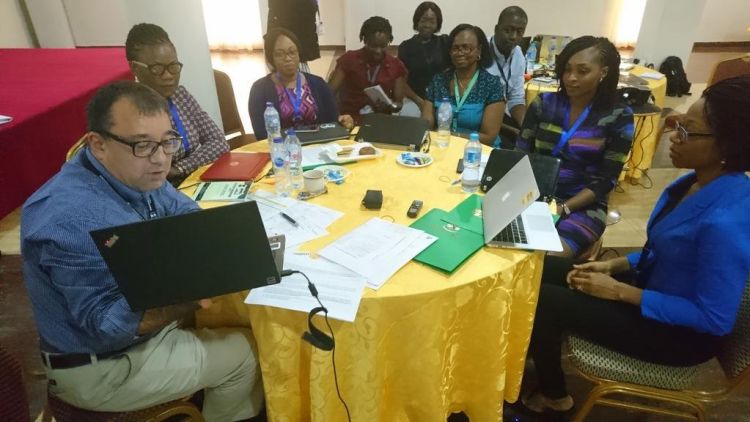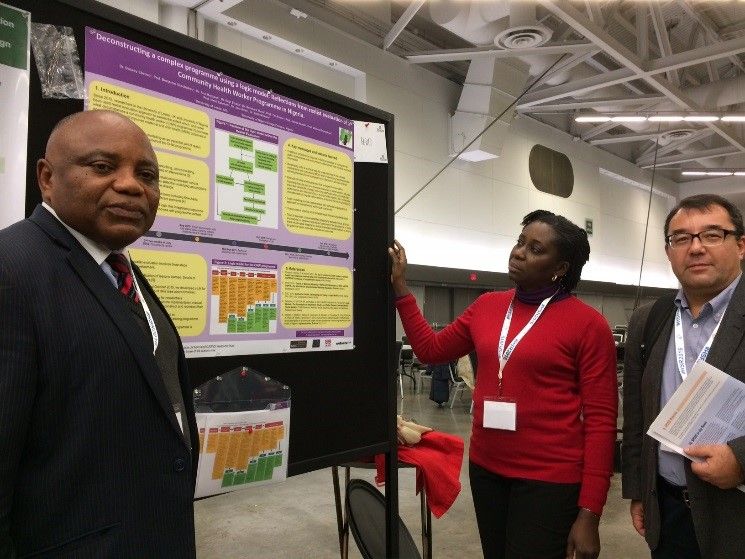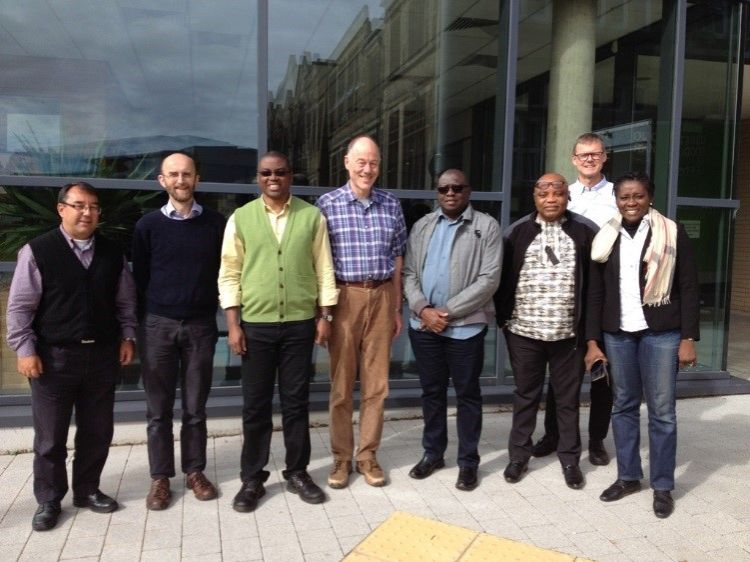Research project
REVAMP
- Start date: 1 July 2015
- End date: 28 February 2021
- Partners and collaborators: University of Leeds and University of Nigeria Enugu Campus Funders: Joint MRC/DFID/ESRC/MRC/Wellcome Health Systems Research Initiative

Description
Determinants of effectiveness and sustainability of a novel community health workers programme in improving maternal and child health in Nigeria (REVAMP)
Background
Despite cutting maternal and infant mortality by half between 1990 and 2008, maternal and child health (MCH) remains a priority in Nigeria. Between 2012 and 2015, the Government of Nigeria implemented a Subsidy Reinvestment and Empowerment Programme (SURE-P) to invest the revenue from fuel subsidy reduction into a social protection fund to improve lives of vulnerable populations.
One component focused on improving access to MCH services and outcomes (SURE-P/MCH) through combination of supply and demand-side issues. The supply-side measures involved recruitment of additional midwives and community health workers (CHWs), infrastructure development and provision of supplies and medicines. The demand-side measures involved mobilisation of Ward Development Committees and provision of conditional cash transfers (CCTs) to pregnant women to facilitate their uptake of ante-natal care, deliver at a health facility, and encourage post-natal care such as vaccinations.
Aims & Objectives
his research seeks to inform strengthening, scaling up, and sustainability of changes achieved by CHW programmes. We investigated to what extent, and under what conditions, a Nigerian CHW programme promoted equitable access to quality services; improved MCH outcomes and under what conditions these changes can be sustained following withdrawal of programme support.
The specific objectives are to:
-
Understand the context and the process of implementation of the interventions, including relationships between health workforce and infrastructure and supplies.
-
Identify, assess and compare the intervention outputs and outcomes during and after withdrawal of targeted support to the programme.
-
Develop a model of complex relations between the actors, context, implementation processes, outputs and outcomes of the interventions during, and after withdrawal of targeted support to the programme.
-
Assess the role of different advocacy and lobbying efforts in entrenching MCH on the political agenda and strengthening service provision, following the suspension of targeted support to SURE-P/MCH;
-
Develop transferable best practices for scalability (expansion within a broadly similar context) and generalizability (expansion to different contexts) of the interventions.
Methods
Realist evaluation provides an overall methodological approach to guide the development, testing and refining of middle-range programme theories and the analysis of the relationships between context, mechanisms and outcomes. This five-year multi-disciplinary and mixed methods study combines four disciplines of health policy and systems research: health economics, social sciences and statistics.

We use combination of quantitative (surveys, analysis of data from health management information systems) and qualitative (in-depth interviews and focus groups).
Further details of our methodology are available in the REVAMP Study Protocol published in Implementation Science and Methods Handbook. Please also see the methodological paper which how examines how we considered different contexts in developing the Logic model for the SURE-P/MCH.
Project outputs
Peer-reviewed publications:
- Okeke C., Manzano A., Obi U., Etiaba E., Onwujekwe O., Mirzoev T., Uzochukwu B. (2021). Exploring mechanisms that explain how coalition groups are formed and how they work to sustain political priority for maternal and child health in Nigeria using the advocacy coalition framework. Health Research Policy and Systems. 19(1):26
-
Onwujekwe O., Ensor T., Ogbozor P., Okeke C., Ezenwaka U., Hicks J., Etiaba E., Uzochukwu B., Ebenso B., Mirzoev M. (accepted, in press). Was the maternal health cash transfer programme in Nigeria sustainable and cost-effective? Frontiers in Public Health, section Health Economics
-
Etiaba, E., Manzano A., Agbawodikeizu U., Ogu U., Ebenso B., Uzochukwu B., Onwujekwe O., Ezumah N. and Mirzoev T. (2020). “If you are on duty, you may be afraid to come out to attend to a person”: fear of crime and security challenges in maternal acute care in Nigeria from a realist perspective. BMC Health Services Research 20(1): 903.
-
Uzochukwu, B., Onyedinma C., Okeke C., Onwujekwe O., Manzano A., Ebenso B., Etiaba E., Ezuma N. and Mirzoev T. (2020). What makes advocacy work? Stakeholders’ voices and insights from prioritisation of maternal and child health programme in Nigeria. BMC Health Services Research 20(1): 884.
-
Mirzoev T., Etiaba E., Ebenso B., Uzochukwu B., Ensor T., Onwujekwe O., Huss R., Ezumah N., Manzano A. (2020) Tracing theories in realist evaluations of large-scale health programmes in low- and middle-income countries: experience from Nigeria. Health Policy and Planning. 35(9):1244-1253
-
Ebenso B., Mbachu C., Etiaba E., Huss R., Manzano A., Onwujekwe O., Uzochukwu B., Ezumah N., Ensor T., Hicks J. Mirzoev T. (2020) Which mechanisms explain the motivation of primary health workers? Insights from the realist evaluation of a maternal and child health programme in Nigeria. BMJ Global Health 5(8): e002408
-
Ebenso B, Manzano A, Etiaba E, Huss R, Uzochukwu B, Newell J, Onwujekwe O, Hicks J, Ezumah N, Ensor T, Mirzoev T. (2019) Dealing with context in logic model development: Reflections from a realist evaluation of a community health worker programme in Nigeria. Evaluation and Program Planning. 73: 97-110.
-
Mirzoev, T., E. Etiaba, B. Ebenso, B. Uzochukwu, A. Manzano, O. Onwujekwe, R. Huss, N. Ezumah, J. P. Hicks, J. Newell and T. Ensor (2016). Study protocol: realist evaluation of effectiveness and sustainability of a community health workers programme in improving maternal and child health in Nigeria. Implementation Science. 11(1): 1-11.
Policy briefs:
- Quality of data within the Health Management Information System in Nigeria.
- How advocacy coalitions work to sustain priority for MCH in Nigeria.
- Is advocacy an effective tool for prioritization of MCH in Nigeria?
- Explaining how primary health workers are motivated
- How security of health facilities shape provision and utilization of services
- Role of Trust in sustaining maternal and child health services.

Newspaper reports:
Sustaining the gains of the SURE-P programme.
Impact
Lessons from this study inform the improvements to similar CHW programmes and health systems strengthening more generally in Nigeria and beyond. The study results should also inform strengthening the individual components of the national health system, for example best practices in staff performance management and further demand-side financing schemes.
Project Partners

Nuffield Centre for International Health and Development, University of Leeds
Professor Tolib Mirzoev (Principal Investigator)
Dr Reinhard Huss (until December 2019)
Professor James Newell (until December 2018)
School of Sociology and Social Policy, University of Leeds
Health Policy Research Group, College of Medicine, University of Nigeria Enugu Campus (COMUNEC)

